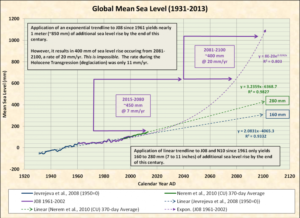by Mc Lean in JoNova, October 8, 2018 in JoNOva
What were they thinking?
The fate of the planet is at stake, but the key temperature data set used by climate models contains more than 70 different sorts of problems. Trillions of dollars have been spent because of predictions based on this data – yet even the most baby-basic quality control checks have not been done.
Thanks to Dr John McLean, we see how The IPCC demands for cash rest on freak data, empty fields, Fahrenheit temps recorded as Celsius, mistakes in longitude and latitude, brutal adjustments and even spelling errors.
Why. Why. Why wasn’t this done years ago?
So much for that facade. How can people who care about the climate be so sloppy and amateur with the data?
…
by JP Riou, 9 octobre 2018 in EuropeanScientist
L’ écologie a renoué avec l’environnement le lien fondamental et sacré qui le relie à l’homme. Par cette communion, elle remplit le vide laissé par les religions dans un contexte d’explosion technologique. Mais elle fait semblant d’ignorer que le fossé s’élargit de toutes parts entre la déclinaison politique de ses principes et le bilan de ses résultats.
La dimension mondiale du phénomène et les sommes inédites qui lui sont consacrées justifient une tentative d’analyse de son origine et de sa démarche, ainsi que de ses ressorts cachés et des conséquences géopolitiques qu’on peut en attendre.
Ces 2 faces de l’écologie politique sont l’objet des 2 parties du présent article.
…
Pour la première parie voir ici
by David Middleton, October 9, 2018 in WUWT
No fracking way! Global sea level can’t even rise by 3 feet by 2100…
…

…
by Geological Society of America, October 9, 2018 in ScienceDaily
-
Even long before medieval inhabitants reclaimed land and raised dykes at a large scale, humans have had a strong impact on river behavior in the Dutch delta plain. Physical geographers have demonstrated that two present Rhine branches developed stepwise in the first centuries CE, because of two combined man-induced effects.
La géologie, une science plus que passionnante … et diverse

